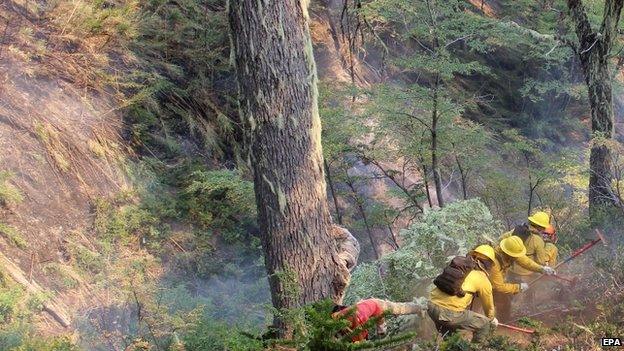Chile declares forest fires alert
- Published

The wildfire has affected 1,860 hectares of the national reserve China Muerta in Melipeuco, some 700 km (440 miles) south of the capital, Santiago.
Chile has declared a national alert because of wildfires in three national parks and reserves threatening trees, some a thousand years old.
Firefighters have been fighting the flames for more than a week in the southern region of Araucania hit by years of drought.
The fires are affecting a park famous for its centuries-old pines known as monkey puzzle trees.
President Michele Bachelet said the country's drought was critical.
She announced millions of dollars of investment to improve access to underground water and to construct desalination plants to provide drinking water.
"Faced with this critical situation, there is no choice but to assume that the lack of water resources is a reality that is here to stay and that puts at risk the development of important regions of our country" President Bachelet said.
The fires are burning in three protected areas: China Muerta National Reserve, Nalca Lolco National Reserve and Conguillio National Park.
Environmentalists have warned the fires are threatening hundreds of plant species and wildlife
They have affected 4,500 hectares (11,000 acres) so far, including 200 hectares in Conguillio, an Andes mountain park popular with tourists because of its volcanoes and monkey puzzle trees.
The trees (Araucaria araucana) are a member of the pine family, and can live up to a thousand years.
Fifteen firefighting brigades are in the area, 700 km (440 miles) south of the capital, Santiago.
The first rains of the southern hemisphere autumn have started to fall in the central and northern regions.
Meteorologists say they are hoping enough rain will reach the south to put out the fires.
Scientists in Chile say they are expecting rainfall to drop significantly by 2050 as the country is increasingly affected by climate change.
The country has 12 desalination plants in construction already, mostly connected to mining projects.
Chile is the world's largest producer of copper.
- Published14 March 2015